
Understanding the Role of Network Consulting in Digital Transformation
Networking has become as critical as the bones and flesh of an organisation. With online transformation already underfoot, according to a survey by McKinsey, 70 percent fail to achieve their prime objectives, mostly due to the difficulty of merging the new technology with legacy systems. As organisations become more dependent on next-generation networks for survival, consulting is gaining both importance and prominence in helping organizations deal with such problems successfully.
The Challenges of Digital Transformation and the Need for Expertise
Complexity of Modern IT Environments
As much as corporations make use of cloud technologies, hybrid infrastructures, the proliferation of Internet of Things (IoT) devices, and a resultant onslaught of cyber threats, complexity rises exponentially creating a headache for corporations in adequately planning and optimising their networks.
One major problem, however, will be to integrate the outdated systems into today's cloud infrastructures. While it may provide dependable legacy infrastructure, this now-short pipe becomes a bottleneck with apps that require high bandwidth and complex cloud technology. Compatibility issues can be performance limiting and can slow down IT environment update efforts. Along with that, security management at distributed systems such as on-premises, cloud, and edge devices really can become Herculean tasks to empower great security and seamless performance.
The development of IoT brought thousands of connected devices, creating an enormous amount of data flow. Without careful planning for the performance of networks, businesses may face problems of congestion, latency, and even down times, which top the list of problems in sectors like healthcare, manufacturing, and retail. Today, the need for good network management and optimization techniques has risen steeply in this remarkably interconnected society.
Aligning Network Strategy with Business Goals
In addition to a blueprint for technology, a network strategy becomes one of the great enablers of the objectives of the organisation as a whole. In particular, for an organisation in the digital transformation journey, network infrastructure would need to align with business goals because it is a precursor in advancing business models and developing customer experience while improving operational efficiencies.
For instance, a network that would support a retail organisation implementing an omnichannel strategy should be able to receive real-time inventories, integrate easily across e-commerce platforms, and ensure the safety of transactions of consumer data. Network consulting would, therefore, be important for this alignment as it offers the enterprises that approach the gap between business objectives and technology implementation.
Tailor-made consultancy for defining a network architecture that sets the pathway for agility and innovation while taking up strategic goals in the network will lead consultants to personalise the counsel. Merging network strategy with business objectives continues to keep businesses well- positioned for long-term success in a market that becomes increasingly competitive every day.
Design Your Ideal Network Today!
Get a future-proof network with our reliable and scalable data network design services.
How Network Consulting Drives Successful Digital Transformation
Strategic Planning and Assessment
Since they are responsible for strategic planning and assessment, network consulting is important. The consultants perform detailed examinations of existing network infrastructure in an organisation intending to discover any gaps, vulnerabilities, and areas of potential improvement. Experts investigate the possible measures to optimize a network according to how it performs, security risks, and scalability needs.
An audit of the network and traffic could expose bottlenecks that lead to possible effects on efficiency. Then, in a digital transformation endeavor, the organisation could be unable to manage the huge data traffic being generated by the telemedicine services. The network specialist may perform extensive capacity planning to ensure that the structure caters to additional traffic without compromising reliability and security.
They also prepare strategic roadmaps specifically tailored to the needs and goals of an organisation; these postulate gradual paths to network upgrades so as not to disrupt current provision and future requirements. Network consultancy enables companies to remain competitive in an ever-changing digital market where technological advancements are integrated and harmonised with the business goals.
Implementation and Optimisation
Strategic planning and integrating new technologies which help improve network performance are important roles played by network consultants. They install, configure, and integrate new networks with the current network infrastructure. Their expertise is used to ensure that strategic objectives are reached while also contributing to operational efficiency.
Consider a multinational firm whose migration strategy moved to a hybrid cloud architecture. The company might bring in network experts to implement SD-WAN, a technology that links different applications to an optimised cloud and ensures the same application performance no matter the global location. Consultants would help business clients with security hardening against emerging threats, compliance objectives, and protecting sensitive information.
Also, network consultants can troubleshoot as well as performance tune. They can find and resolve problems quickly with the use of cutting-edge tools and best practices, thus minimising the time spent down while offering a positive experience for the user. Whether they are improving cloud connectivity or fine-tuning performance, their services are critical in supporting organizations in attaining both technological and business goals.
Key Benefits of Engaging Network Consulting Services
Reduced Risk and Improved ROI
Every digital transformation project is vulnerable to risks like as unplanned outages, security breaches, and delays. Accessing network consulting services is one of the proved ways to mitigate these risks, keeping projects on time and budget while fulfilling company objectives.
For instance, a financial institution trying to migrate to a cloud would incur several downtimes affecting consumer transactions and sullying its reputation. The disruption can be avoided as network consultants make proactive planning, exhaustive testing, and strategic oversight that would ensure operational continuity and consumer confidence.
In addition to all these, network consultants also advise on risk management. The consultants assist in resource allocation to companies to improve ROI by identifying cost-effective options while reducing unnecessary expenses. Their expertise would ensure that the investment in technology provides tangible returns, boosting long-term operational efficiency rather than costly failures due to ineffective management.
Access to Specialized Expertise and Best Practices
Firms can employ network consulting services to gain access to expertise and industry best practices that would otherwise be unavailable in house. Consultants keep abreast with the latest network technology, security standards, and incoming trends so that they can come up with updated solutions tailored according to client needs.
For example, a manufacturer that installs IoT devices across its supply chain may take advantage of the consultant's skill in creating a low-latency, high-reliability network. A consultant directs the companies through the fast-shifting technology world, giving unprejudiced, non-bias advice free of vendor influences and internal constraints.
Network consulting helps to utilise the vast pool of knowledge and strategic insights that engineers have in form of internal consultants to reach informed decisions, implement the latest technologies and devices, and maintain competitive advantage in their industry.
Digital transformation is a challenging journey that involves rigorous strategy, execution, and ongoing optimisation. Network consulting services provide the strategic counsel, technical experience, and implementation assistance required to align network infrastructure with business objectives, resulting in successful outcomes and long-term success in a digitally connected world.
Network consultants contribute to risk reduction, ROI improvement, and smooth digital transformation by tackling the complexities of present IT infrastructures, integrating network strategy to business goals, and using specialist talents. Organisations embarking on transformational projects should not go it alone.
The Anticlockwise team is here to assist you successfully navigate the complexity of digital change. Our professionals offer specialised guidance, cutting-edge solutions, and tried-and-true tactics to ensure that your network is scalable, agile, and innovative. Contact us today to learn how we can help your organisation achieve its strategic goals and prosper in an increasingly competitive digital market.

Managing Director
